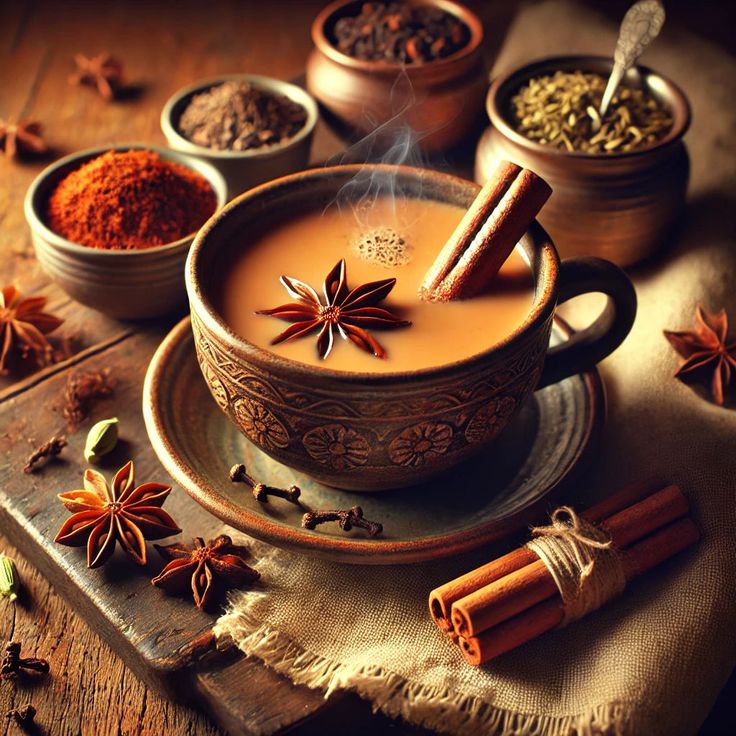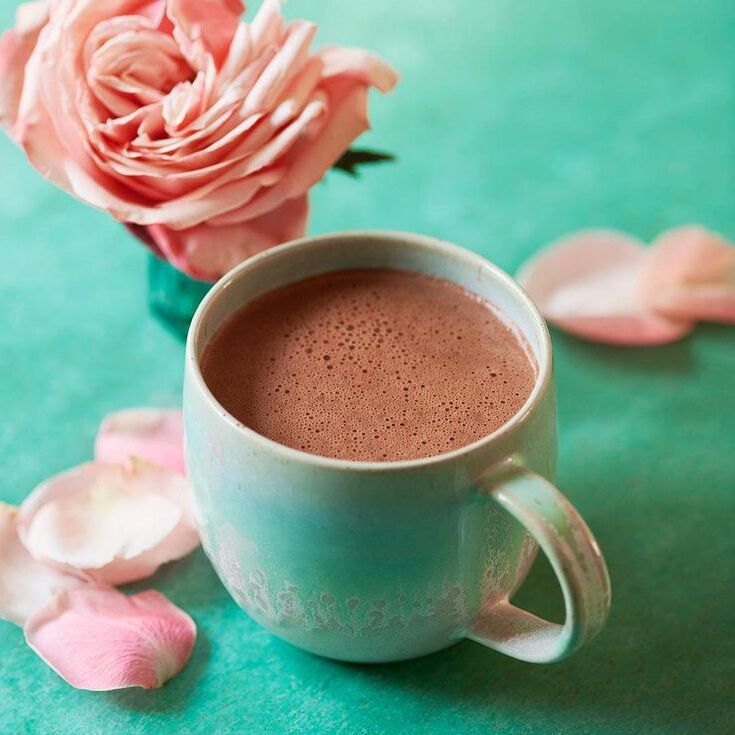The Origins of Chai Tea
Chai tea boasts a rich history rooted in antiquity. Markets and streets across India have long echoed with calls of ‘Chai, Chai’. Chai, meaning ‘tea’ in Hindi, originates from the word ‘cha’, the Chinese word for tea. This beverage’s story starts over 5000 years ago. Legend suggests it began as an Ayurvedic tonic. Ingredients varied according to regional practices and availability. Back then, it likely included a mix of spices, herbs, and tea leaves. Historically, traditional chai did not always contain tea leaves. The version with black tea became popular in the 1800s. Indian merchants started adding tea leaves to the mix during British colonial rule. This marked the blend’s evolution into what we know today as ‘chai tea’.
The core elements were always the spices. These vary by region but often include cardamom, cinnamon, ginger, cloves, and black pepper. Each household today may have its own secret recipe passed down through generations. The traditional method of preparation involves simmering or boiling a mixture of these spices with black tea, milk, and sweetener. The result is a flavorful, aromatic, and warming brew. It offers a distinct taste and numerous health benefits. From its Ayurvedic origins to the modern-day coffee shop menus, chai tea’s journey is a testament to its versatility and enduring appeal.

Key Ingredients and Their Health Contributions
Chai tea is not only popular for its taste but also for its health benefits. Each key ingredient in chai tea contributes to its overall health-boosting properties. Here’s how some of the main spices in chai tea can benefit your health:
- Cardamom: This aromatic spice is known for its digestive aid. It helps relieve bloating and indigestion.
- Cinnamon: Cinnamon is loaded with antioxidants. It can also help regulate blood sugar levels.
- Ginger: Ginger, a powerful anti-inflammatory agent, assists in digestion and can soothe nausea.
- Cloves: Cloves have antiseptic properties and are also rich in antioxidants.
- Black pepper: It enhances nutrient absorption and improves digestion.
Together, these spices create a synergistic effect that contributes to various aspects of wellness. Besides spices, chai tea also contains black tea leaves. Black tea is rich in polyphenols. Polyphenols can help reduce inflammation and combat cell damage. Furthermore, the milk typically added to chai tea offers calcium, which is important for bone health. Sweeteners, like honey or sugar, can provide quick energy, though they should be used sparingly to avoid excess calorie intake.
The balance of spices in chai tea yields a potent blend. It offers not just flavor, but also significant contributions to one’s health. Remember to enjoy spiced tea as a part of a balanced diet to reap its full benefits.
Antioxidants in Spiced Tea and Their Effects
Chai tea is a rich source of antioxidants. These natural substances fight off harmful free radicals in the body. Free radicals can damage cells. They lead to aging and various diseases. Antioxidants from chai tea help to counter this damage. This protection enhances overall health.
The black tea in chai contains catechins and theaflavins, both of which are types of antioxidants. These compounds play a crucial role in promoting health by reducing inflammation.They also guard against heart issues and cancer. Cinnamon, another chai ingredient, has polyphenols. These are among the most potent antioxidants available.
Ginger, also in chai, contains gingerol. It is an antioxidant with powerful effects. Studies show gingerol supports your immune system. It may protect against neurological diseases as well. Cloves, too, contribute high levels of antioxidants. These can aid in preventing chronic diseases.
Regularly drinking chai tea can boost antioxidant intake. This can support the body’s own defense system. Over time, this may lead to improved health. It’s important to drink chai tea as part of a balanced diet. Only then can you enjoy the full benefits of its antioxidants. Remember, moderation is key.

Digestive Health and Chai Tea
Chai tea is renowned for its digestion-enhancing benefits. The spices in chai have been used for centuries to aid digestion. They work together to boost gastrointestinal health. Many people enjoy spiced tea not only for its taste but also for the comfort it brings to their stomach.
- Ginger, a key ingredient, is effective against digestive discomfort. It can alleviate symptoms like nausea and bloating.
- Cardamom also plays a role in digestive health. It helps to ease indigestion and can reduce gas.
- Black pepper in spiced tea stimulates digestive enzymes. These enzymes speed up the digestion process.
- Cloves, along with their antiseptic qualities, help manage digestive disorders.
- Cinnamon, besides being an antioxidant, can decrease digestive issues.
The process of brewing chai tea itself can be soothing. The act of slowly sipping a warm cup may aid in the digestion of meals. It can also promote a feeling of fullness, which helps in avoiding overeating. For individuals with sensitive stomachs or those who experience regular digestive troubles, spiced tea can be a delightful and beneficial addition to their diet. Remember to enjoy this aromatic beverage in moderation as part of a healthy lifestyle. Advise from healthcare providers should be sought for those with particular health concerns.
Chai Tea and Cardiovascular Health
Chai tea’s benefits extend to the heart. Drinking it can support cardiovascular health in several ways. The ingredients in chai tea have a positive impact on heart-related functions. Here are the cardiovascular advantages of regular spiced tea consumption:
- Black tea: The base of spiced tea contributes to better heart health. Studies show it can lower bad cholesterol levels (LDL). Keeping LDL in check is important for a healthy heart.
- Cinnamon: Part of chai’s spice mix, cinnamon, aids heart function. It can reduce high blood pressure, a risk factor for heart disease.
- Ginger: Ginger improves blood circulation. Better circulation reduces the risk of heart problems.
- Cardamom: This spice has been linked to good heart rhythms. It also helps to lower blood pressure.
- Cloves: They possess properties that may help prevent blood clots. This is crucial for preventing strokes and heart attacks.
Each sip of chai tea is a step towards a healthier heart. Regular consumption could be part of a strategy to maintain cardiovascular health. Always pair it with a balanced diet and consultation with a doctor. Especially for those already managing heart conditions.
Remember, chai tea is a tasteful ally for your heart. Drink it moderately to benefit from its cardiovascular advantages.

Weight Loss and Metabolism Boosting Properties of Spiced Tea
Chai tea’s benefits also include aiding in weight loss and boosting metabolism. The combination of spices in chai tea can help increase metabolic rate, which can lead to burning more calories. Here’s how spiced tea supports weight management:
- Ginger: This fiery spice can boost metabolism, aiding in weight loss efforts.
- Cinnamon: Its impact on blood sugar levels can help control appetite.
- Black pepper: Known to help break down fat cells, it aids in the metabolism of fats.
- Cardamom: This spice also boosts metabolism and contains diuretic properties, which can help reduce bloating.
Drinking chai tea can make you feel fuller for longer. This can lead to reduced snacking and help manage caloric intake. When paired with a healthy diet and regular exercise, spiced tea can be a great addition to a weight loss plan. Remember, moderation is essential; overconsumption of chai tea can lead to excess calorie intake, especially if sweeteners are added.
As an added benefit, the thermogenic properties of these spices—meaning they generate heat in the body—can also slightly elevate energy expenditure. While chai tea should not be solely relied on for weight loss, it can be a pleasing supplement to a balanced lifestyle aiming for a healthier weight.
Spiced Tea and Its Impact on Mental Wellbeing
Chai tea not only warms the body but also soothes the mind. Its impact on mental wellbeing is notable. Here are several ways how spiced tea can positively affect your mental health:
- Stress relief: The act of sipping warm chai can help calm the mind. The process itself is a form of relaxation.
- Mood booster: Spices like cinnamon and cardamom release a pleasing aroma. A nice scent can uplift your mood.
- Improved alertness: Chai tea contains caffeine. A moderate amount can sharpen your focus and improve alertness.
- Better sleep: Some spices in chai, such as cloves and cardamom, may promote better sleep practices. Good sleep is vital for mental health.
While it offers great taste, chai tea also acts as a comforting beverage. It can become part of a daily routine to promote relaxation and enhance mental clarity. Drinking spiced tea in a quiet moment can help you pause and recharge, making it a simple pleasure that supports your mental wellbeing. Remember, moderation is key. Too much caffeine could affect sleep, so limit spiced tea in the evening. For mental health concerns, always seek professional advice.

How to Incorporate Spiced Tea into Your Daily Routine
Incorporating chai tea into your daily routine can be both simple and rewarding. This flavorful beverage offers numerous health benefits and enjoyable moments throughout your day. Here are some effective tips to seamlessly add spiced tea to your lifestyle:
Morning Boost
Start your day by replacing your usual morning coffee with a cup of spiced tea. Chai contains black tea, which offers a gentler caffeine kick. This can provide the energy boost you need in the morning without the jitters associated with coffee. The blend of spices also kick-starts your metabolism and enhances your overall mood for the day ahead.
After Meals
Consider enjoying a cup of chai tea after lunch or dinner. The spices found in chai, such as ginger and cardamom, act as natural digestive aids. Drinking chai at this time can help you feel more comfortable after a meal, promoting digestion and reducing bloating.
Study or Work Breaks
Taking breaks during study or work hours is essential for maintaining productivity. Opt for a cup of spiced tea during these breaks. The aromatic spices in chai can sharpen your focus, invigorate your senses, and refresh your mind. This small ritual can help clear your thoughts and recharge your energy for the tasks ahead.
Evening Ritual
Create a calming pre-bedtime ritual by incorporating caffeine-free spiced tea into your evening routine. This soothing beverage promotes relaxation and helps you unwind after a long day. Drinking it before bedtime can signal to your body that it’s time to wind down, making it easier to transition into a restful sleep.
Chai Tea Latte
Treat yourself by making a chai tea latte at home. Combine brewed spiced tea with steamed milk, adding a touch of honey or sweetener if desired. This delightful beverage is a delicious way to enjoy the warmth and richness of chai spices while reaping its health benefits.
To get the most from chai tea, keep it balanced. Avoid excessive sweeteners to maintain its health properties. Limiting your intake to 2-3 cups a day allows you to enjoy spiced tea’s numerous benefits without overdoing it. Always check in with your healthcare provider if you have specific dietary needs or health concerns. Enjoy your chai journey!

Potential Side Effects and Considerations
Drinking chai tea offers many benefits, yet there are some side effects and considerations to keep in mind. Moderation is key to ensuring that the positives outweigh any negatives. Here are some potential effects to be aware of:
- Caffeine sensitivity: Chai tea contains caffeine. Those sensitive to caffeine may experience jitters, anxiety, or disrupted sleep.
- Calorie content: Chai tea can be calorie-dense, especially if made with sugar and full-fat milk. Opt for low-fat milk and less sugar.
- Gastrointestinal issues: While spiced tea aids digestion for many, some might find the spices irritating. This might lead to stomach upset.
- Effect on iron absorption: Tea can hinder the body’s ability to absorb iron from food. It’s best to avoid drinking spiced tea with meals rich in iron.
- Blood sugar levels: Sweetened spiced tea could impact blood sugar levels. Those with diabetes should watch their intake.
- Blood pressure: Spices in chai tea can affect blood pressure. Those with high or low blood pressure should monitor their response to chai.
- Allergic reactions: Although rare, allergic responses to certain spices in spiced tea are possible. Know your allergies before indulging.
Always consult a healthcare provider if you’re unsure about incorporating chai tea into your diet. They can offer personalized advice based on your health background. Enjoy spiced tea wisely to enhance your health without unwanted side effects.